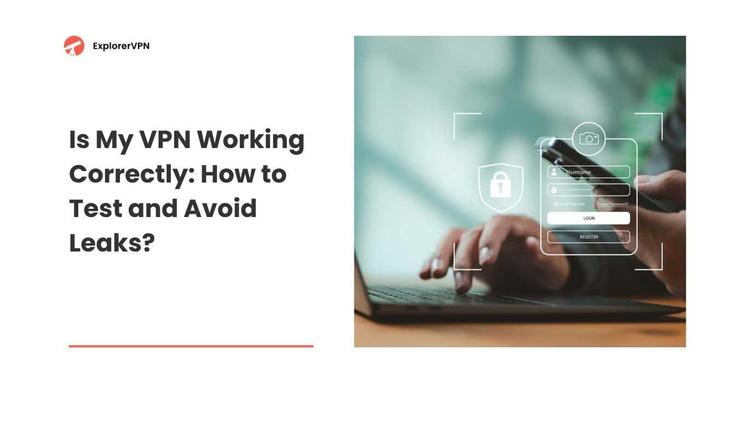VPN Pros and Cons for Individuals and Businesses
A VPN, or Virtual Private Network, is a tool that creates an encrypted connection between your device and the internet. It hides your IP address, protects sensitive data, and makes your online activity more private by routing your internet traffic through a secure VPN server.
The pros of a VPN include online privacy, secure connection, remote access, protection of sensitive data, avoiding bandwidth throttling, and access to streaming services. The cons include slowing down the internet, possible VPN blocking software, higher VPN prices, and disadvantages of using a VPN if the provider is untrustworthy.
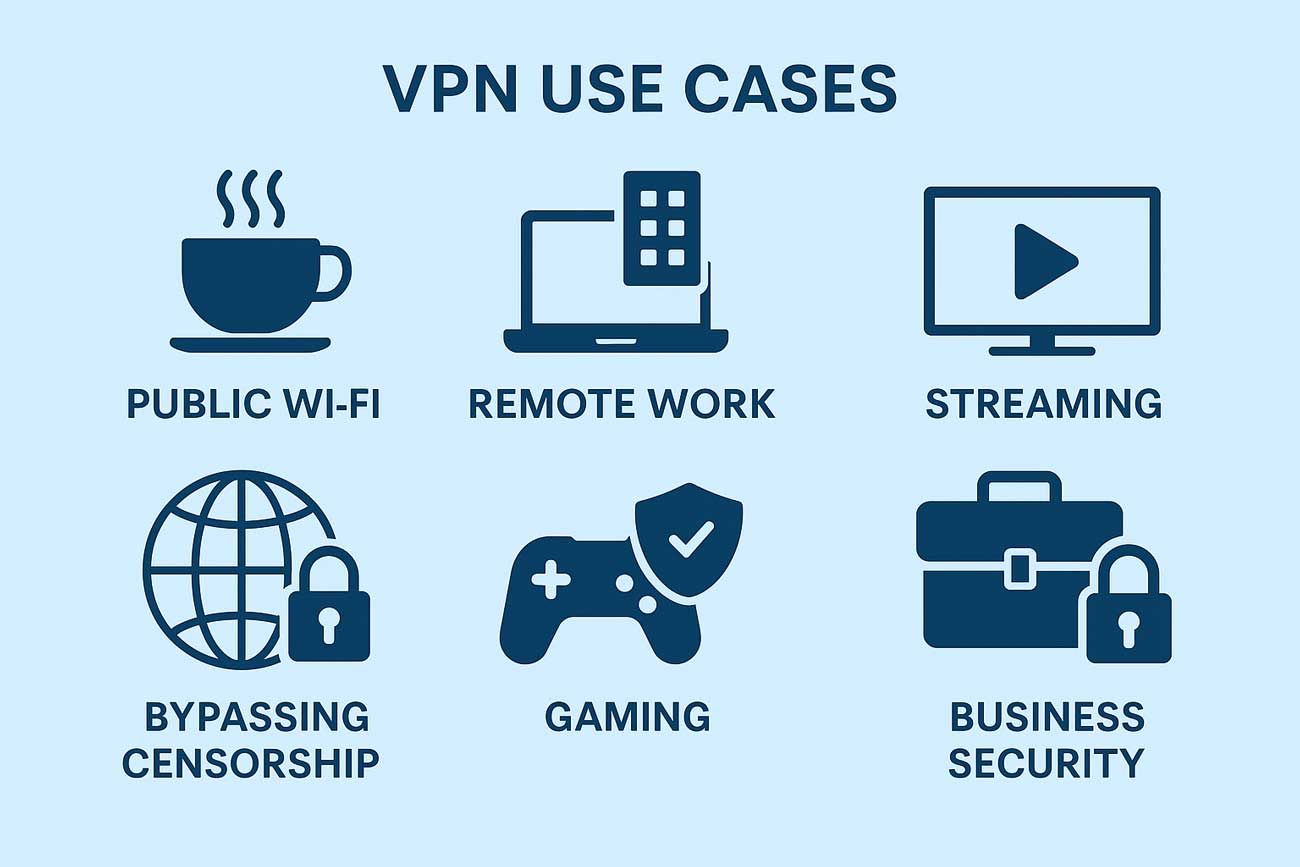
VPN Use Cases
What are the pros of using a VPN?
Using a VPN comes with many advantages that improve online privacy, boost network security, and make internet connections safer and more flexible for both personal and business needs.
Stronger online privacy
One of the biggest VPN benefits is privacy. When you connect to the internet, your internet service provider and even some websites can track your internet traffic. Using a VPN hides your IP address and protects sensitive data. This means advertisers and site tracking user data companies have a harder time building a profile about you. The advantage of VPN privacy is that you get more control over what is shared and what stays hidden.
Secure connections on public Wi-Fi
When you use public Wi-Fi at a coffee shop, airport, or library, your internet connection is not safe. Hackers can see your data packets and try to steal company data, passwords, or sensitive data. VPN connections create secure access by building an encrypted tunnel that no one else can look inside. This secure connectivity makes the importance of VPN very clear for students, travelers, and remote workers.
Remote access for remote workers and businesses
A VPN is also important for businesses. We discuss that further below. Many companies need remote users to log in from home or while traveling. VPN providers offer VPN plans that give secure remote access to company data. Remote workers benefit because they can still use business websites safely through a private network. This is one of the biggest benefits of a VPN in the modern world of cloud computing architecture and smart devices.
Bypassing censorship and gaining access to content
Some countries or schools block certain websites or streaming services. A VPN service allows you to gain access to these sites by connecting to a VPN server in a different server location. This advantage of VPN use is important for people who want consistent access to educational sites, entertainment, or even business websites. Many VPN users rely on this to stream shows or movies from other countries.
Preventing bandwidth throttling
Another major benefit of using VPN services is protection against bandwidth throttling. Sometimes a service provider slows down your internet speed when you use too much data or certain streaming services. With a VPN, your internet traffic is hidden in an encrypted tunnel, so the provider cannot easily apply data throttling. This advantage of VPN technology gives you smoother streaming and better connection speed.
Protecting gamers and businesses from DDoS attacks
DDoS attacks overload your connection by sending too much fake internet traffic. Gamers and businesses can suffer from these attacks. VPN protect features hide your IP address, making it hard for attackers to target you. This adds extra network security and secure connectivity, especially for online competitions or business websites.
Benefits for streaming and entertainment
VPN benefits also include the ability to enjoy streaming services from different regions. Many VPN users subscribe to VPN plans just for this advantage. With the right VPN service, you can bypass VPN blockers and VPN blocking software used by streaming platforms. This way, you gain access to shows, sports, and movies otherwise unavailable in your country.
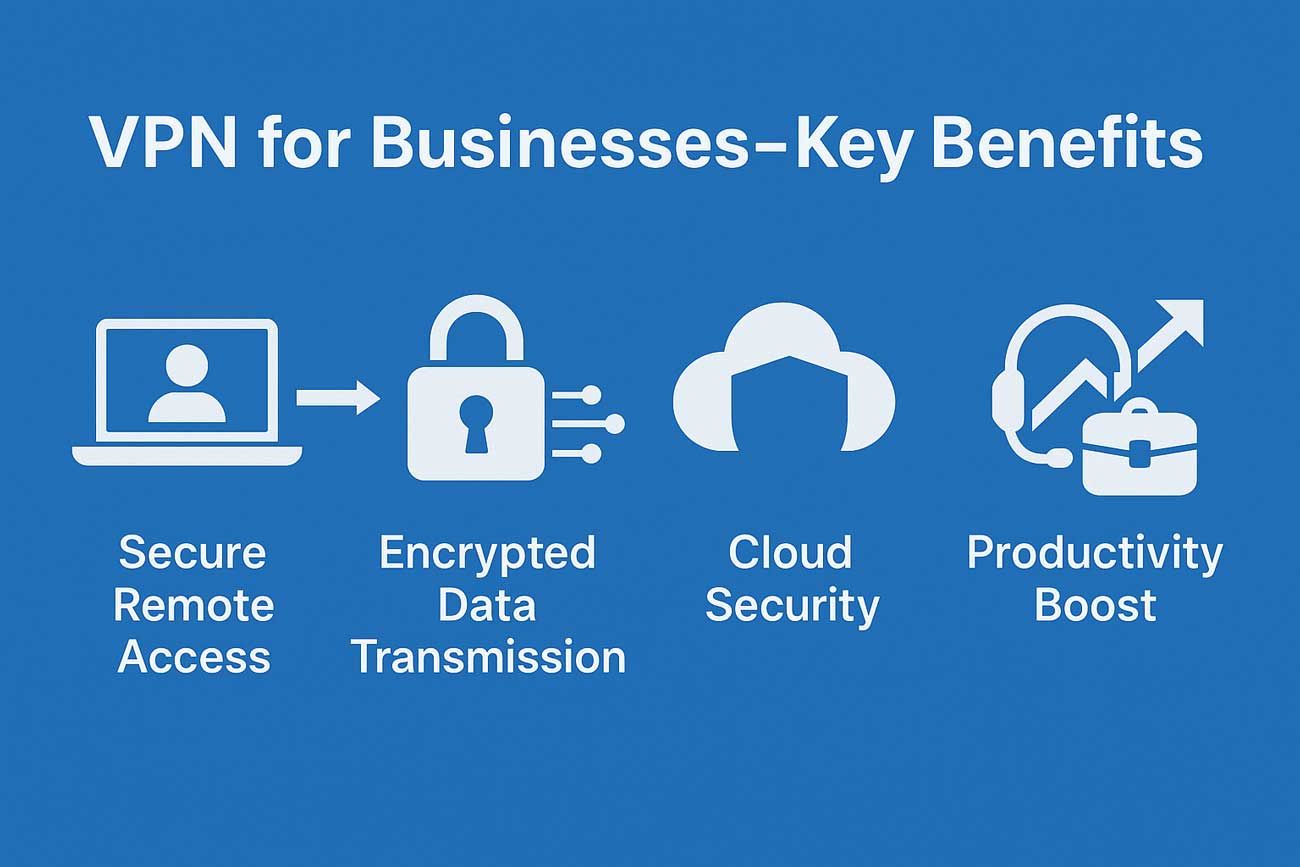
VPN for businesses key benefits
Benefits of a VPN for business
VPN benefits are especially important for businesses today. With more remote workers, online services, and cloud computing architecture, the advantages of VPN use go far beyond personal browsing. Here are the main business-related VPN benefits explained in detail:
- Secure remote access. VPN connections allow employees to log into company systems safely from anywhere. This advantage of VPN technology means remote users can reach sensitive company data or internal business websites without worrying about data interception.
- Encrypted data transmission. When data packets travel across a Wi-Fi network, they can be exposed to hackers. A VPN service creates an encrypted tunnel, ensuring secure data transmission and protecting business communications from outside threats.
- Protection of sensitive data. Businesses handle sensitive data such as customer information, financial records, and company data. VPN protect features shield this information by creating secure connections, reducing the risk of theft or leaks.
- Access for remote workers. Remote workers need consistent access to files, tools, and company servers. A VPN service makes this possible by providing secure connectivity, so employees stay productive without exposing the private network to risks.
- Support for cloud computing architecture. Many businesses depend on cloud systems to store files and run applications. VPN connections integrate with cloud computing architecture, creating secure connections between company devices and cloud services, keeping company data safe.
- Avoiding data caps and throttling. Some internet service providers enforce data caps or use data throttling that slows down internet speed. Businesses benefit from VPN services because encrypted traffic hides how much data is being used, avoiding unnecessary slowdowns.
- Stronger defense against attacks. Businesses are common targets of hackers and DDoS attacks. VPN security features such as encrypted connection and hidden IP addresses add extra protection. Even VPN blockers or VPN blocking software become harder to bypass for attackers when strong VPN providers are used.
- Consistent access and performance. VPN benefits also include consistent access to business websites and applications. By using VPN servers in multiple server locations, employees can connect to whichever VPN server’s information provides the best connection speed.
- Improved network security. VPN services add another layer of network security to a company’s overall security measures. Encrypted private connection features ensure secure data transmission, making it harder for outsiders to intercept company data.
- Support services and productivity. Many VPN providers include technical support services with their VPN plans. These services help businesses set up VPN connections, maintain secure remote access, and solve connection speed issues quickly, which boosts productivity.
What are the cons of using a VPN?
Despite the plentiful benefits, VPNs have a few disadvantages too.
Slowing down the internet
One of the main disadvantages of using a VPN is slowing down the internet. Since your internet traffic has to travel through an encrypted tunnel to a VPN server, your connection speed can drop. Some VPN providers invest in faster servers, but not all VPNs can deliver the same performance. If internet speed is very important to you, this VPN disadvantage can be frustrating.
VPN blocking and restrictions
Some websites and streaming services use VPN blockers or VPN blocking software. This means they try to stop VPN connections from working. Not all VPN providers can bypass these blocks, so you may lose consistent access to certain websites or shows. This is a disadvantage of VPN use for people who mainly want streaming services. Make sure your VPN is working before using such sites.
Trust issues with providers
Another problem is that not all VPN providers are honest. Some free VPNs keep logs of your internet traffic, which means your private network is not private at all. They may even sell site tracking user data to advertisers. This is one of the biggest VPN disadvantages because people expect VPN protect features to work. Choosing the wrong provider could put sensitive data at risk.
Costs and VPN prices
While there are free VPNs, most secure and reliable VPN plans come at a cost. VPN prices can add up, especially for businesses that need multiple accounts for remote workers. Some people may see this as a disadvantage of VPN use, since not everyone wants to pay monthly or yearly fees for security solutions.
Technical problems and connection speed
Sometimes VPN connections drop, causing your device to reconnect without encryption. Not all VPNs have a kill switch feature to prevent this. Other times, VPN disadvantages include slower connection speed because of crowded server locations. These technical issues can interrupt secure remote access and make the internet connection unstable.
Legal or policy issues
In some countries, using a VPN is restricted or illegal. Even where it is legal, certain websites may block VPN users, and companies may have rules against it. The disadvantages of VPN use here are clear: you may face penalties or simply lose access to services.
Compatibility with devices and services
Not all VPNs work well with all smart device connects. Some devices, like gaming consoles or certain web browsers, may need special setup. VPN disadvantages also include limits on how much data you can move if the provider enforces data caps. This makes it harder to enjoy the full benefit of VPN connections.
False sense of security
A big disadvantage of VPN use is that people think VPN protect solves all problems. In reality, a VPN service only secures internet traffic and hides your IP address. It does not replace antivirus, firewalls, or other security measures. Without proper security solutions, users may still face risks like phishing or malware.
Do VPNs help with your personal privacy and security?
VPNs do help with personal privacy and security, but not in every way people sometimes think. A VPN hides your IP address and creates an encrypted tunnel so your internet service provider, public Wi-Fi hackers, or site tracking user data companies cannot easily see your internet traffic. This gives you stronger network security when you connect to a private network or public Wi-Fi.
However, VPN disadvantages include the fact that they cannot stop all threats. A VPN service cannot block viruses, phishing scams, or unsafe downloads. Even with VPN protect features like internet protocol security or secure remote access, you still need other security measures such as antivirus software and safe browsing habits.
The main benefits of using VPN services for privacy are secure connectivity, secure data transmission, and protection from data interception. But they do not guarantee total online privacy because certain websites, apps, or even not all VPN providers may still collect sensitive data. So the advantages of VPN use are real, but they should be seen as one part of a bigger plan for online security.
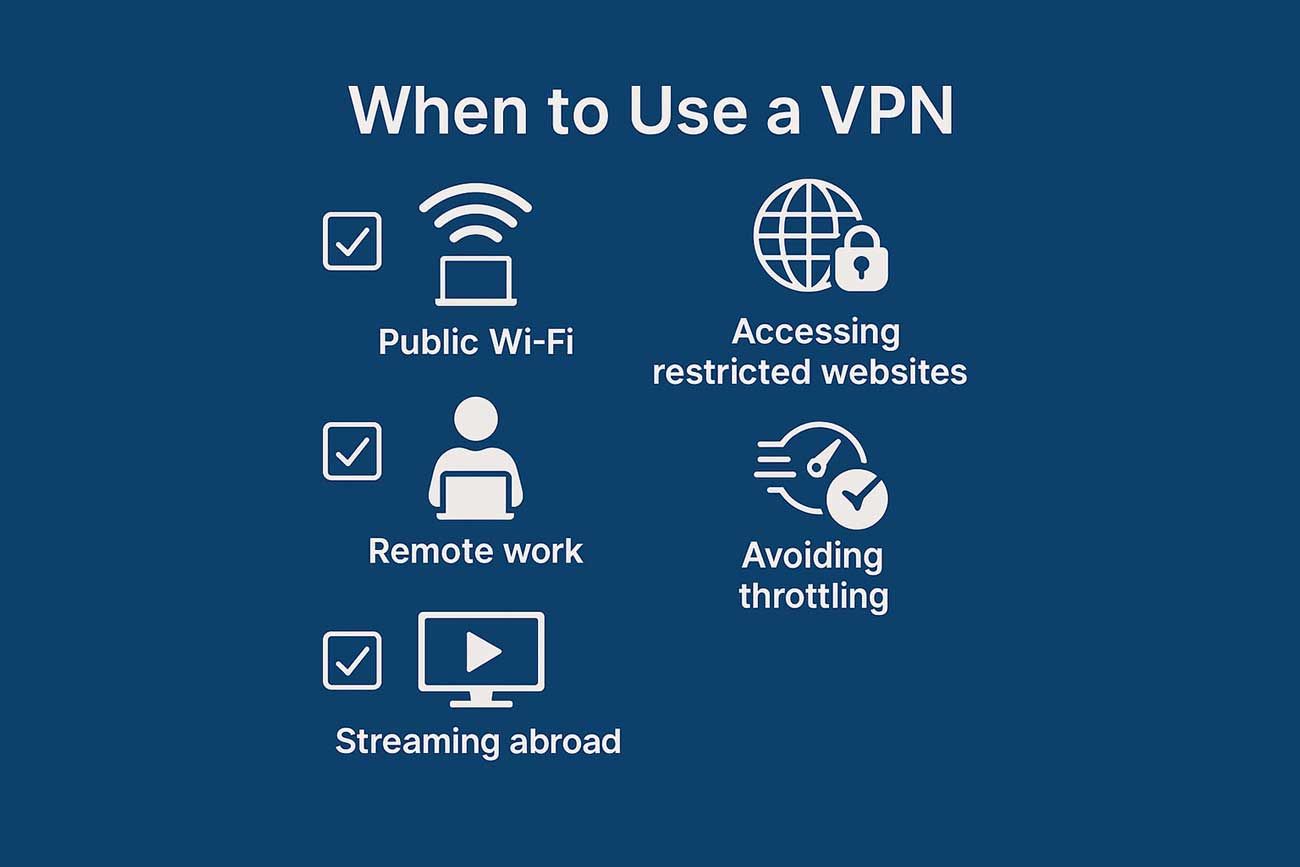
when to use vpn
When should you use a VPN?
You should consider using a VPN in situations where privacy, security, or access are important, such as:
- Connecting to public Wi-Fi networks in places like airports, cafes, or libraries
- Protecting sensitive data such as passwords, company data, or financial information
- Bypassing VPN blockers or VPN blocking software that restrict certain websites
- Gaining access to streaming services or websites that are restricted in your region
- Allowing remote workers to have secure access to business websites and private networks
- Avoiding data throttling or data caps from your internet service provider
- Creating secure connections when using cloud computing architecture or online tools
- Improving overall online privacy by hiding your IP address and encrypting internet traffic
How to choose the best VPN?
When comparing VPN providers, look at VPN plans, VPN prices, and support services. Not all VPN providers offer the same VPN advantages. Some provide internet protocol security, others specialize in streaming services, while some focus on cloud computing architecture. A good VPN service should provide fast connection speed, secure connectivity, and strong encryption for data packets. Always check whether the VPN service logs your internet traffic. Look for VPN providers with strong privacy policies, multiple server locations, and reliable support services. We recommended checking out ExplorerVPN as it meets the important criteria of choosing a VPN and offers a 7-day free trial.
Are free VPNs safe to use?
Free VPNs are popular, but they come with disadvantages of VPN use. Some free VPNs do not provide secure data transmission and may sell your site tracking user data. They can also contain stronger VPN disadvantages like slower connection speed, VPN blockers, or limits on how much data you can use. While the advantage of VPN is clear, not all VPNs are created equal. Free VPNs may lack strong security measures, meaning sensitive data could be at risk. If online privacy, network security, and secure connection are important, paid VPN plans are often safer.
Proxy vs VPN
A proxy and a VPN may sound similar, but there are big differences. A proxy only hides your IP address when you connect through web browsers or certain websites. A VPN, on the other hand, creates an encrypted private connection for all internet traffic. VPN benefits include secure connectivity, protection of sensitive data, and bypassing data throttling. Proxies lack the security features of VPN connections and do not protect against data interception. While proxies can help you gain access to blocked websites, only VPN services provide full network security, secure data transmission, and protection from VPN disadvantages like DDoS attacks.
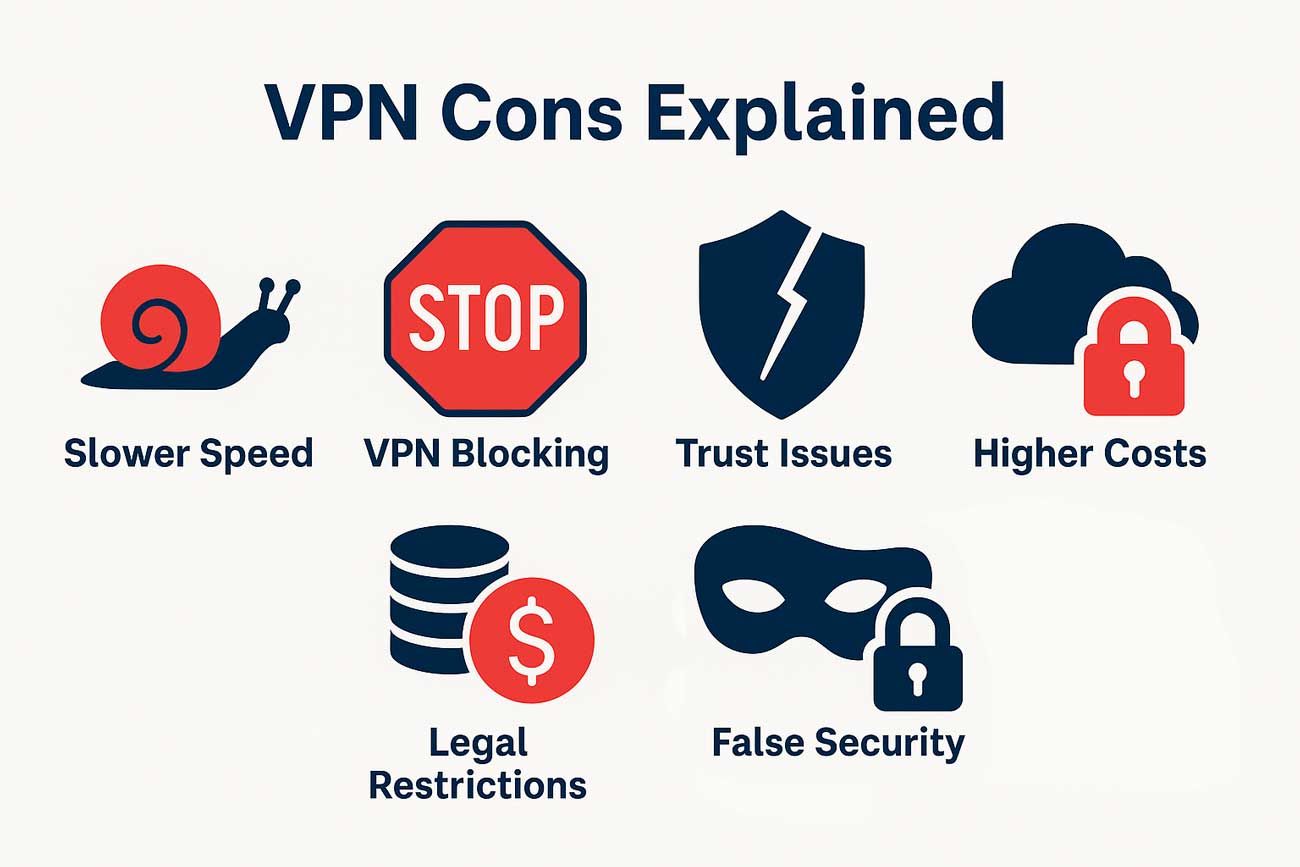
VPN Cons
Do the positives of VPNs outweigh the negatives?
Looking at VPN pros and cons, the benefits of a VPN outweigh the disadvantages of VPN. VPN users get secure remote access, protection from data interception, and the ability to gain access to streaming services. While disadvantages of using a VPN include slowing down the internet or higher VPN prices, the importance of VPN for secure connectivity and online privacy is undeniable.
Businesses benefit from secure connections for remote workers and cloud computing architecture, while individuals enjoy streaming services and protection from site tracking user data. In conclusion, VPN advantages and disadvantages exist, but overall VPN benefits outweigh VPN disadvantages for most users who care about security, online privacy, and a consistent secure connection. What is more, a VPN not only helps in the work field but also when looking for cheaper flights or using various social media platforms in the places where they are blocked.





